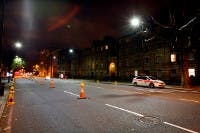Outdoor Lighting: London makes LED street light plans; US and UK projects
The Transport for London (TfL) transit authority has announced plans in conjunction with the Mayor's office to upgrade 35,000 streetlights with LED luminaires and to install a networked adaptive control system to monitor and control the streetlight inventory. North East Lincolnshire is also pursuing a solid-state lighting (SSL) project in the UK targeting 16,500 lights. In the US state of Rhode Island, meanwhile, the activity of a small utility district has shown the cost-saving benefits of LED lighting, and the state is planning a program to aggressively push adoption of SSL.
London SSL plans
The London streetlight project will support Mayor Boris Johnson's target goals of reaching a 60% reduction in carbon emissions by 2025. "With tens of thousands of lights marking the way on our road network it makes complete sense to focus energy and resources on bringing them up to 21st century standards," said Johnson. "This is the largest investment to modernize streetlighting on major roads in our capital's history and will not only cut carbon emissions and save money but it will also lead to even better and safer roads for Londoners."
The TfL authority has a total inventory of 52,000 lights on the TfL Road Network (TLRN). The plan is to ultimately upgrade all of the lighting over ten years, but the first phase will focus on 35,000 lights that will be replaced by 2016 either as part of normal TfL maintenance or as targeted retrofits that can deliver the most savings. The first phase is projected to reduce emissions by 9700 metric tons annually while saving TfL GBP 1.85 million (about $3 million) — a 40% savings. The initial phase will cost GBP 10.9 million so payback will take a few years.
The savings will be extended in terms of both maintenance costs and maximum energy efficiency by a lighting network with controls and what TfL terms a Central Management System (CMS). TfL will use the system to set light levels to the minimum safe levels based on traffic and pedestrian activity, and to automatically detect required maintenance.
TfL said that it has already awarded a contract to supply the CMS to Harvard Engineering. Moreover, it said that the value of adaptive controls has already been proven out in other UK-based SSL trials. For example, London was one of the cities that took part in the LightSavers consortium trialing LED-based lighting and controls. The TfL also installed LED lighting in the Upper Thames Street tunnel two years back.
Burrillville, Rhode Island
Meanwhile, municipalities large and small continue to pursue SSL streetlight upgrades around the globe. The Pascoag Utility District in Burrillville, Rhode Island, for example, became the first entity in the state to test LEDs on 56 streetlights, according to the Providence Journal. The small project has resulted in a $1710 decrease annually in energy costs and $2535 decrease in maintenance costs.
But the impact of the project could be far greater. In part the success is leading Rhode Island to be the first state to force utilities to allow municipalities to buy energy-efficient streetlights and capitalize on savings. Work in the Rhode Island Public Utilities Commission will allow municipalities to get a lower rate for lower-power fixtures, and an even lower rate when adaptive controls are applied. The action could make the state a leader in LED adoption for roadway lighting.
North East Lincolnshire
Back across the pond in the UK, London is far from alone in installing LED lighting. We recently covered a project in Bath involving LEDs installed on the A4 roadway. Moreover, the Yorkshire Post recently reported that the North East Lincolnshire Council was launching a project involving 16,500 streetlights.
The upfront cost of the project will be GBP 8.2 million that will be spent over the next two years. But the Council pointed to a combination of energy savings, safer roads, and reduced light pollution as justification for the expense.






